Unit 7 基础模块二
模块七 Unit 2 复习讲解及练习1[1]
![模块七 Unit 2 复习讲解及练习1[1]](https://img.taocdn.com/s3/m/bb7dfb7731b765ce0508147f.png)
模块七Unit 2 Fit for life 【No. 1】【考点透视】1.trial n.尝试;努力;试验;试用;询问;审讯Her child is a trial to his teacher.◎on trial在试验中,在测试中◎be on trial for sth. 因……而受审He’s on trial for murder.◎trial and error反复试验,从失败中找出解决办法try v.努力,尝试◎try to do努力干某事try doing试着、尝试干某2. name n.姓名vt.说出……名字;给……取名;提名;决定The couple named the child Dick.◎worth(worthy of) the name名副其实的◎in the name of凭……的权威,以……的名义◎call sb. names辱骂某人◎by name以名字,指名道姓地He was criticized by name.◎name…after…以……的名字命名◎name sb. as任命某人担任(某职务)Mr. Michael has been named as the new manager.3. mass n.质量,团,块,大量Density is the relationship between mass and volume.◎in the mass总体上;总的说来She says she doesn’t like children in the mass.◎mass media大众传媒◎the masses群众◎mass production大量生产◎a mass of/ masses of大量的I’ve masses of work to do, so I can’t see you off at the airport tomorrow.4. wonder n 奇观;惊叹;令人感到惊奇的人或事v.惊讶,想知道They were filled with wonder when they saw the palaces.It’s a wonder that he remained alive after dropping from the roof of a ten-storied building.○do wonders创造奇迹○in wonder惊奇地○no wonder怪不得No wonder he is not hungry; he has been eating sweets all day.(It is) no wonder that…怪不得……○wonder at/ about…对……感到惊讶○wonder that…想知道⊙wonder和wander为两个相似词但wonder意为惊讶,想知道;wander漫游,游荡5. point n.尖;观点,论点v.瞄准;指向point at/point to He pointed his gun at his enemy.to the point 中肯;恰当I wish she would get to the point and tell us what we should do.to the point of (doing) sth.达到某种程度He was rude to the point of being aggressive.up to a point 在某种程度上I agree with you up to a point.on the point of (doing) sth. 正要做某事时There is no / little / any / great point in doing sth. 做……没有/几乎没有/有意义point out 指出6. relieve v.安慰,宽慰;减轻(痛苦或者忧虑)This drug will relieve your discomfort.☆relieve one’s feelings 发泄感情☆relieve sb. of sth. 替某人拿……;解除某人负担、责任等relief n. 减轻,免除;安慰,宽慰;救济☆to one’s relief 使某人感到宽慰的是☆relief fund 救济金☆give relief to sb.’s sorrow 减轻某人的悲伤relieved adj.(感到或显出)宽慰的,放心的We felt relieved to hear you were safe7. millions of 数百万的,大量的1)当million, thousand, hundred, dozen, score等表示约数时,其后要带of短语,这几个词都要用复数形式,且此类短语之前不可加具体的数量词。
英语基础模块第二册Unit7教案
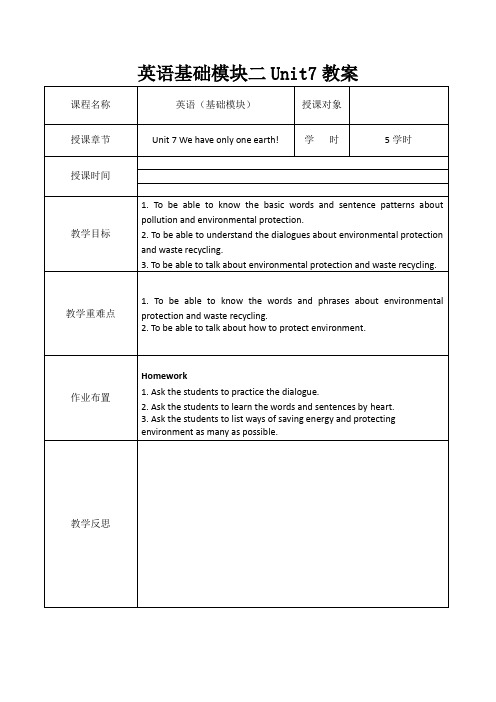
英语基础模块二Unit7教案S1: Happy new year, S2! Here’s a small gift for you.S2: Wow! What a beautiful toy rabbit! Is this a DIY gift?S1: Yes. I made it with an old glove.S2: It’s so charming/cute. And, it’s a great example of recycling, too.S1: I hope you like it.S2: Certainly. I like it very much. It’s really special. Thank you!Step 2 Listening & Speaking practice (2)H e Ying: Oh dear, look at the sky. It’s so dusty.Li Dong: How terrible! Another sandstorm is coming!He Ying: Yeah, it makes it hard for people to breathe.Li Dong: And the dust makes me feel very sick.He Ying: Me too. And look, the traffic is moving so slowly.Li Dong: Sandstorms may cause many traffic problems.He Ying: We must do something about it.Li Dong: Right. We should plant more trees and grasses.Listen again and fill. 7. Ask the students to listen to the dialogue again. And then ask them to make dialogues with the given words and pictures in Activity ③in pairs.1. Ask the students to look at the picture on Page 68 and guess what happened.2. Ask the students to listen to the dialogue of Activity ④and practice the dialogue after tape.3. Ask the students to repeat the dialogue and try translating it into Chinese.4. Present the two sentences and explain the different meanings:It makes it hard for people tobreathe.The dust makes me feel very sick.5. Listen and fill in the form in Activity ⑤.6. Ask the students to discuss other ways of preventing sandstorms. And make new dialogues about other kinds of pollution.1. Ask the students to read the ways of energy-saving and environment-protecting in Activity ①on Page 69, and pay attention to the words above.Step3:Reading Practice (1)I flush the toilet with grey water. And when I go shopping, I take a cloth bag or a basket.I ride my bike to school.I do paper folding crafts with old newspapers.When printing files, I use both sides of the paper.I use energy-saving light bulbs.Discuss and list.1. Turn off the lights when you leave the room.2.3.Key sentences:I flush the toilet with grey water.When printing files, I use both sides of the paper.Step4 Reading Practice (2)How can we fight against pollution at school?•Collect all waste paper and litter.•Never spit in public areas.•Take care of the plants on campus.•Volunteer to clean up the school.•Create a school website about environmental protection.•Put up educational posters around the school.•Put all rubbish in dustbins.•Organise a green club.Read and match. 2. Ask the students to listen to the tape, and answer the questions above.3. Play the tape again and ask the students to read after the tape. Explain the meanings of these sentences to the students.4. Ask the students to complete Activity ②.1. Ask the students to read the ways of fighting against pollution at school on Page 70, and learn the key words:2. Play the tape. Answer :How many measures does the passage mention? Do you spit in public areas?Do you have a green club in your school or class?3. Ask the students to listen to the tape again. Ask several students to state the ways of environment protecting in Chinese.4. Ask the students to look at the signs and pictures in Activity ④on Page 70, and then match them.1. Read the passage of Activity⑤, and answer the questions:How many categories can waste be classified into? What does recyclable rubbish include?Step 5 Reading Practice (3)Read and learn.Sorting refuse is a good way to save resources. In general, waste can be classified into four categories—recyclable rubbish, kitchen waste, harmful rubbish and other waste. Recyclable rubbish includes waste paper, plastic, glass, metal and cloth items. Kitchen waste usually includes leftovers, bones, vegetable roots, leaves, peel, etc. Harmful rubbish includes used batteries, broken lamps, expired drugs, etc. Other waste usually consists of things that are difficult to recycle, such as bricks, toilet paper, tissues, etc.Read again and classify【课堂小结】Step 6 Consolidation and summaryI. Review the words in this lesson.II. Pick up some sentences from this unit and put them on the slide. Ask the students to explain and translate them.III. Encourage the students to save energy and protect environment in daily life.【板书设计】What does kitchen waste usually include?What does harmful rubbish include?2. Present the new words:sort refuse resource in general classify waste category3. Ask the students to listen to the tape and pay attention to the words.4. Play the tape again. Listen and try to classify the four kinds of rubbish in Activity ⑤.5. Read the passage again, and complete the exercise in Activity ⑥.6. Check the answers and learn the words together.。
中职英语基础模块学生用书第二册Unit 7
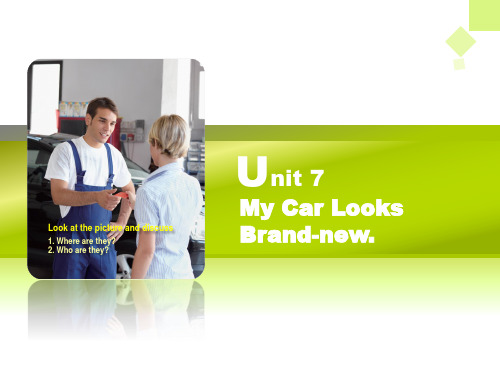
1. What was wrong with Mary’s car? Smoke kept coming out from under the hood. 2. What did Steve ask Mary to do first? Steve asked Mary to start the car and let him see. 3. What happened when Mary started the car?
Jimmy: The engine has had a full service and the brakes are working well again.
Laurie: Good job. Jimmy: I’ve also cleaned it inside and out and given it a polish. Laurie: That’s very nice of you. Thank you. Jimmy: No problem. I’m still new at the garage and I’ve just started learning. Laurie: I know, but I bet you’ll do well with service like this.
2. What happened to the vegetable oil before it flowed into the engine? The vegetable oil travelled through a set of filters, flowed through a tube and got heated.
courses on car repairing. Jack: That’s a good idea.
高教版中职英语(基础模块 第2册)Unit 7《So much to do before we travel》ppt课件4
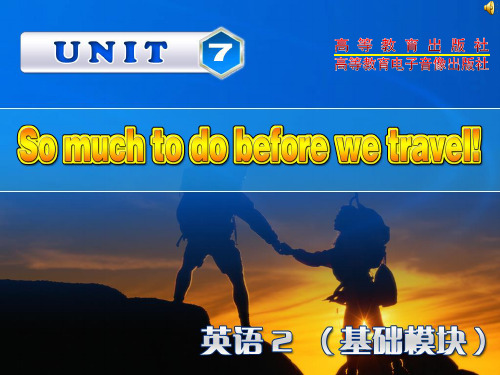
relax, enjoy the singing of birds
lake
boating, fishing
downtown city
comfortable shoes, cash, credit card
shopping, seeing a movie, eating in a good restaurant
Useful Expressions about suggestion:
1. We'll be on holiday next week. 2. What about …? 3. How about...? 4. Let’s do.... 5. Where shall we stay? 6. Shall we ...? 7. Why don’t you …? 8. Why not ...? We can.... 9. What do we need to take with us?
Place to go Things to take Activities to do
forest
tent, food, drink, food for birds and animals, warmer clothes, medicine, camera food, drink, food for fish, sunglasses, camera
Listening Practice :
You are going to listen to a conversation about Cathy and Myra , they will be on holiday next week. Listen to the sound recording and find out (大家即将听到关于Cathy、Myra的
英语基础模块2 学生用书B2 U7 电子试题附答案
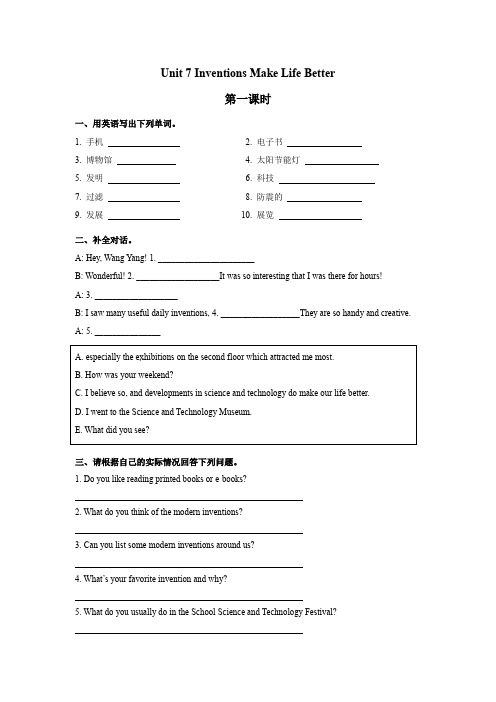
Unit 7 Inventions Make Life Better第一课时一、用英语写出下列单词。
1. 手机2. 电子书3. 博物馆4. 太阳节能灯5. 发明6. 科技7. 过滤8. 防震的9. 发展10. 展览二、补全对话。
A: Hey, Wang Yang! 1. ______________________B: Wonderful! 2. ___________________It was so interesting that I was there for hours!A: 3. ___________________B: I saw many useful daily inventions, 4. __________________They are so handy and creative. A: 5. _______________三、请根据自己的实际情况回答下列问题。
1. Do you like reading printed books or e-books?2. What do you think of the modern inventions?3. Can you list some modern inventions around us?4. What’s your favorite invention and why?5. What do you usually do in the School Science and Technology Festival?四、连词成句。
1. prefer, use, phone, instead, to, I, mobile, of, telephone, the___________________________________________________________________________ 2. China, paper-making, of, is, the, inventions, one, greatest, ancient, in___________________________________________________________________________ 3. from, inventions, people’s, so, come, daily, many, life___________________________________________________________________________ 4. ideas, are, inventions, about, new, to, share, students, invited___________________________________________________________________________ 5. who, blind, useful, people, is, really, for, it, the, are___________________________________________________________________________五、成长必修课。
高教版中职英语(基础模块 第2册)Unit 7《So much to do before we travel》ppt课件2

6). since “自从...” ,主句常用现在完 成时,从句常用一般过去时
We have been friends ever since we met at school. 我们自从在学校认识至今一直是朋友。
常用句型“ It is/ has been + 时间段+ since 从句”译为“自从…多长时间了”
while 的特殊用法 while 可用于对比,意为“然而” e.g. I prefer black tea, while he likes coffee.
PRACTICE
1. We were swimming in the lake _A_____ suddenly the storm started.
It is three years since she joined the army.
时间状语从句其它引导词:
the moment, the minute, every time, each time, by the time, the day等,也可引导一个时间状语从句。
The day he returned home, his father was already dead.
1.连接词when, while, as 的用法区别
连接词类别 作 用
as
as 从句中动词是延续性时,侧重表示主从句动作 同时发生,意为“一边…一边…”
whenBiblioteka 强调动作的先后性,从句动词可以是延续性动词也 可以是非延续性动词。
while
强调动作的持续性及同时性,从句常用延续性动词 。
用while, when填空:
A. when B. while before
C. until D.
module7 unit2全部知识点精讲精练1

M7 Unit2 Fit for lifeI. Words in the wordlist1.recipe:[cn.] 处方; 烹饪法;制作法,诀窍成功的诀窍:I’d like to have your recipe for cookies. 译:He thinks the only success lies in hard work. 他认为成功的唯一诀窍是勤奋.2.open up: v.打开,展开,开发/adj.开着的open up a medicine cupboard 打开一个药柜对…开放:The port will be opened to the foreign ships next month.这个图书馆已经开了3年了。
3.probability: n.①(句型)很有可能…He worked too late last night. There is a possibility that he will be late today.Is there any probability of our getting there in time.It is possible for us to finish the job ahead of time.②There is no doubt that…③There is no need for sb to do sth. / that …④It’s no use doing sth4.acid: adj. ( more acid, most acid) 酸的;刻薄的have an acid taste 有酸味/ 酸雨/ an acid comment5.trial: n. 试验考验;审讯,审判We must put the machine to trial. We must give the machine a trial.He couldn’t stand the trial. 译:a public trial 公审 a trial flight 试飞 a trial match 预赛on trial 试验性的尝试错误(的做事方法)6.standardize:vt. 使标准化n. standard生活标准:;标准药片:;为某人设立高标准.:7.thin: vt./vi使变薄,变稀,使淡(过去式/过去分词:;进行式:)You can thin down this paint with water.adv. 薄的,稀疏地Cut the bread thinneradj. 瘦的稀少的She looks thinner than before. He has thin hair.8.block: vt.①妨碍,阻塞阻止某人做某事:The crowed blocked the street.译:Her father blocked her plan to study abroad.译:②n. 木块石块;街区路障:an office block 办公大楼③a block of 一块一块石头:The post office is two blocks away. 邮局在前面两条街的地方。
中职英语基础模块2(修订版)第七单元Unit-7单词
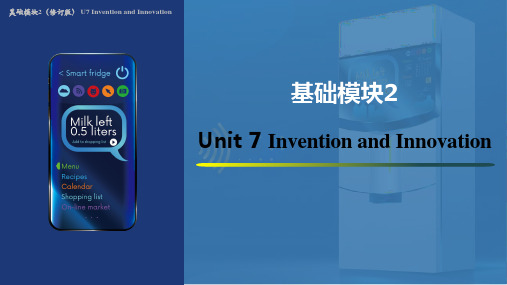
smart
/smɑːt/ adj. 智能的;机智的
基础模块2(修订版) U7 Invention and Innovation
delivery guarantee
theater smart online
online
/ˌɒnˈlaɪn/ adj. 在线的;网上的
feature besides benefit
benefit
/ˈbenɪfɪt/ v. 有益于
基础模块2(修订版) U7 Invention and Innovation
in the beginning
be doubtful about
in a way
Internet of Things (IoT)
基础模块2(修订版) U7 Invention and Innovation
基础模块2
Unit 7 Invention and Innovation
基础模块2(修订版) U7 Invention and Innovation
virtual software
video operate
pick
virtual
基础模块2(修订版) U7 Invention and Innovation
delivery guarantee
theater smart online
theater
/ˈθɪətə(r)/ n. 电影院;剧场
基础模块2(修订版) U7 Invention and Innovation
delivery guarantee
theater smart online
delivery
/dɪ'lɪv(ə)rɪ/ n. 递送
牛津英语模块七unit2知识点

牛津英语模块七unit2知识点一、词汇知识重点短语focus on集中于open up打开;开拓in from以------形式carry out执行,实施try out测试;参加选拔in large quantities大量地pick out挑选by accident意外地beneficial[英][ˌbeniˈfiʃəl]adj.有利的,有益的;[法]可享受利益的be beneficial to 对-------有利benefit[英][ˈbenifit]n.利益,好处;救济金,津贴;义演,义卖;恩惠,恩泽vt.有益于,有助于;使受益;得益,受益复数:benefits第三人称单数:benefits过去式:benefitedbenefitted过去分词:benefitedbenefitted现在分词:benefitingbenefittingbenefit from /by 从-------中受益be of benefit to sb.对某人有益for the benefit of为了-------的利益possess[英][pəˈzes]vt.拥有;掌握,懂得;主宰;缠住,迷住第三人称单数:possesses过去式:possessed过去分词:possessed现在分词:possessingpossessiontake possession of占有;拥有in possession of占有in the possession of sb.为某人所有potential[英][pəˈtenʃəl]adj.潜在的,有可能的;[语法学]可能语气的,表示可能性的;有能力的n.潜力,潜能;[物]电位,势能;潜能的事物;[语]可能语气复数:potentialspotential for (doing) sth.(做)某事的可能性realize one’s (full) potential (充分)发挥某人的潜能have the potential to do sth.有做某事的潜力astonish Vt. 使十分惊讶,使吃惊astonish sb.使某人吃惊it astonishes sb. that------ -------让某人惊讶astonished adj. 感到十分惊讶的astonishing adj. 令人十分惊讶的astonishment n. 惊讶be astonished at ----- 对------感到惊讶be astonished see ----- 见到------觉得惊讶to one’s astonishment 令某人吃惊的是The astonishing news astonished everybody.And there were astonished looks on their faces.那个令人惊讶的消息让大家感到惊讶,他们的脸上带着惊讶的表情。
最新中职英语基础模块2教案:Unit7
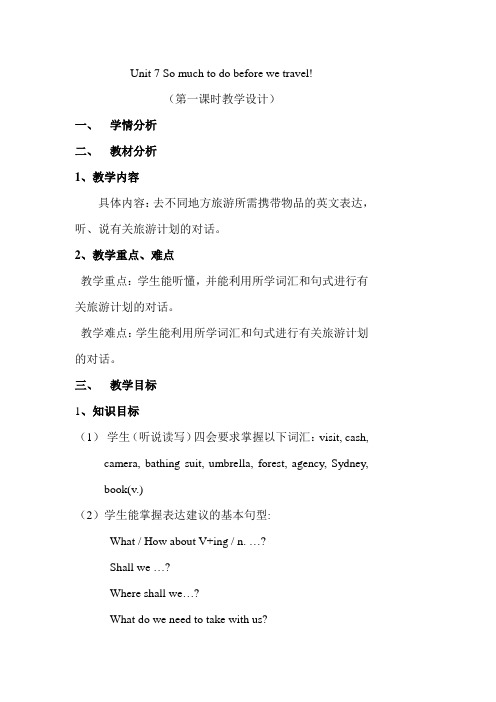
Unit 7 So much to do before we travel!(第一课时教学设计)一、学情分析二、教材分析1、教学内容具体内容:去不同地方旅游所需携带物品的英文表达,听、说有关旅游计划的对话。
2、教学重点、难点教学重点:学生能听懂,并能利用所学词汇和句式进行有关旅游计划的对话。
教学难点:学生能利用所学词汇和句式进行有关旅游计划的对话。
三、教学目标1、知识目标(1)学生(听说读写)四会要求掌握以下词汇:visit, cash, camera, bathing suit, umbrella, forest, agency, Sydney,book(v.)(2)学生能掌握表达建议的基本句型:What / How about V+ing / n. …?Shall we …?Where shall we…?What do we need to take with us?Let’s …That’ a great / wonderful idea.I really like …Sure.That’s cool.四、教学步骤Step One Lead in1. Free talk:2. Show the pictures of Activity 1 one by one, and ask:3. Show a picture of a foreign country and ask:Step Two Listening1. Read the question to the class: “What are Cindy and Annie talking about?”Ss listen and answer. (Activity 3)2. Make sure Ss understand the meanings of the words and phrases first, and then let Ss listen and tick. Check the answers. (Activity 4)Step Three Speaking1. Ask Ss to read aloud after the tape and underline the wordsand sentences for giving suggestions. (Activity 6)Step Four SummaryAsk Ss to review the words and phrases they have learned in class, and then summarize the sentence structures of giving suggestions. Read them together.Step Five Homework1. Ask Ss to recite the dialogue of listening after class.2. Ask Ss to copy the new words and phrases of this part.3. Ask Ss to get some information about Sydney.板书设计Unit 7 So much to do before we travel!(第二课时教学设计)一、教材分析1、教学内容具体内容:一篇有关在澳大利亚悉尼的旅游介绍,训练学生从中获取细节信息的能力。
《Unit7 We have only one earth!》说课稿
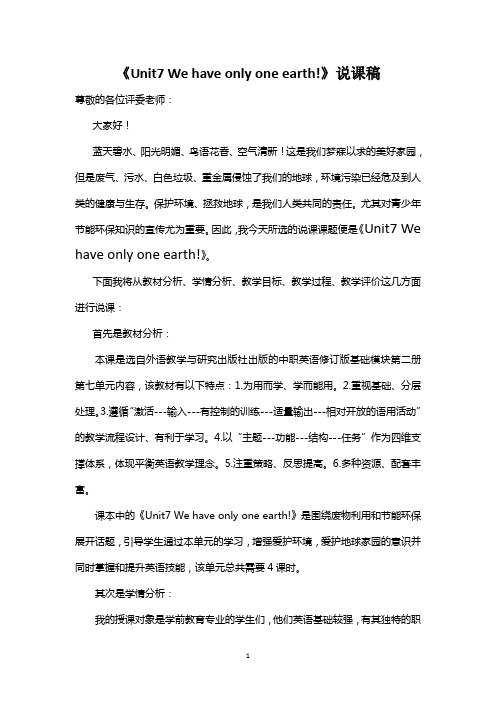
《Unit7 We have only one earth!》说课稿尊敬的各位评委老师:大家好!蓝天碧水、阳光明媚、鸟语花香、空气清新!这是我们梦寐以求的美好家园,但是废气、污水、白色垃圾、重金属侵蚀了我们的地球,环境污染已经危及到人类的健康与生存。
保护环境、拯救地球,是我们人类共同的责任。
尤其对青少年节能环保知识的宣传尤为重要。
因此,我今天所选的说课课题便是《Unit7 We have only one earth!》。
下面我将从教材分析、学情分析、教学目标、教学过程、教学评价这几方面进行说课:首先是教材分析:本课是选自外语教学与研究出版社出版的中职英语修订版基础模块第二册第七单元内容,该教材有以下特点:1.为用而学、学而能用。
2.重视基础、分层处理。
3.遵循“激活---输入---有控制的训练---适量输出---相对开放的语用活动”的教学流程设计、有利于学习。
4.以“主题---功能---结构---任务”作为四维支撑体系,体现平衡英语教学理念。
5.注重策略、反思提高。
6.多种资源、配套丰富。
课本中的《Unit7 We have only one earth!》是围绕废物利用和节能环保展开话题,引导学生通过本单元的学习,增强爱护环境,爱护地球家园的意识并同时掌握和提升英语技能,该单元总共需要4课时。
其次是学情分析:我的授课对象是学前教育专业的学生们,他们英语基础较强,有其独特的职业发展方向、岗位要求和学习特点,热衷于信息化教学。
根据教学内容及学生学情,本次教学设定了语言知识、语言技能、情感态度三维目标,并由此确定了教学重、难点。
根据实际教学环境,我的教学实施设计思路是:课前:自主学习,进行资源整合。
课中:1.激趣导入2.实施任务3.互动交流4.拓展提升课后:进行课堂小结,感悟收获。
最后:做教学评价,自主反思。
让学生们在做中学,学中做,用学做结合的教学策略,即情景设置关联学习目标;游戏动漫激发学习兴趣;以信息化手段激活想象与创造;合作探究提升到理论实践。
高教版中职英语基础模块第2册Unit7Somuchtodobeforewetravel

Book1 Unit 7 So much to do before we travel. 1课时15计应班黄淑梅一. 教学内容授课内容为中职英语基础模块二第七单元Listening & Speaking 两部分,具体为1.Listen and finish the three tasks. 2. Study and recite the dialogue. 3. Make a similar dialogue.二. 教学重点、难点⑴ 教学重点通过本课学习,学生能够用英语谈论旅行准备,合理提出建议,接受或礼貌拒绝建议。
⑵ 教学难点旅行所带物品的英文名称及选择某旅行目的地的原因。
三. 教学目标1.知识目标1)学生能掌握本单元所学谈论旅行准备的单词和词组,如:countryside, view, cash, umbrella,comfortable shoes, camera, tent,be on holiday, take photos,forest, credit card等。
2)学生能掌握给出建议的四个句型:What about…? How about…? Let’s…. shall we…?2. 能力目标学生能口头谈论旅行准备,合理给出建议,赞成别人的建议或礼貌拒绝别人的建议。
3. 情感目标学生了解旅行能够增长见识,愉悦身心,故应努力创造机会外出旅行,但亦同时记住,走南,闯北,还是家最好。
East and West, home is the best!四.教学步骤Step One Review (5 min)1.ReviewWords checking:1.camera 2。
cash 3.scenery 4.countryside 5. 预约时间6.呼吸新鲜空气7.tent8.life ring9.总是10.填表(设计意图:帮助学生经常复习所学单词/词组,并能够迅速集中学生精神,带领他们进入上课状态。
(完整版)高教社中职英语基础模块2 Unit_7
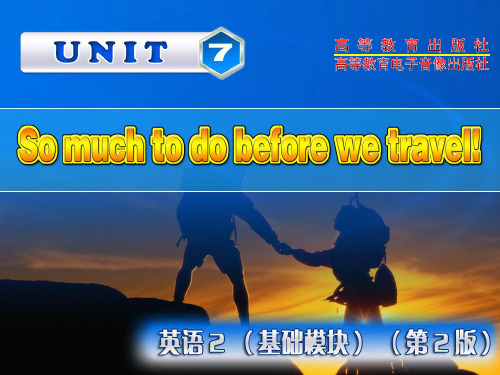
exercise book comfortable shoes
life ring tent
5. Listen and complete.
Who suggests? Cindy Annie
Where to go?
Why ?
mountain climbing It’s a good exercise.
Cathy: No, let’s stay in a tent. I have a very good tent.
Myra: That’s cool!
7. Talk and practice.
Place to go forest lake
Things to take
tent, food, drink, food for birds and animals, warmer clothes, medicine, camera
cash bathing suit life ring camera sunglasses food for animals medicine comfortable shoes umbrella tent
forest
1. Look and discuss.
cash bathing suit life ring camera sunglasses food for animals medicine comfortable shoes umbrella tent
Myra: That’s a great idea, Cathy. Where shall we go? Cathy: How about visiting a big city? We can go shopping! Myra: Oh, big cities are too tiring. Let’s go to the countryside. We’ll
英语基础模块2UNIT 7导学案
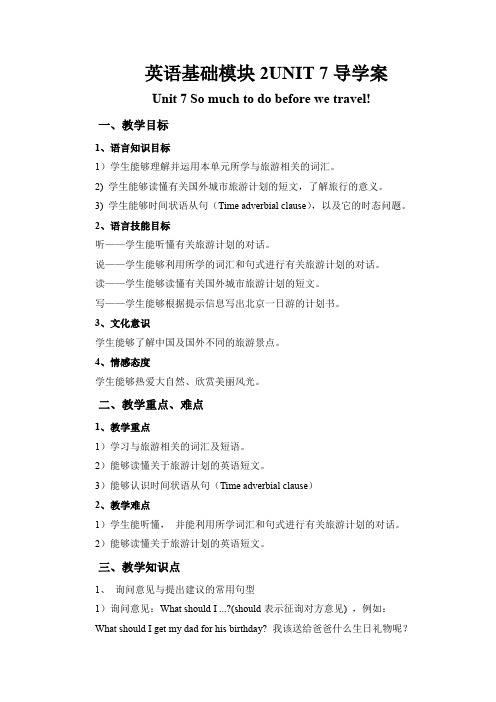
英语基础模块2UNIT 7导学案Unit 7 So much to do before we travel!一、教学目标1、语言知识目标1)学生能够理解并运用本单元所学与旅游相关的词汇。
2) 学生能够读懂有关国外城市旅游计划的短文,了解旅行的意义。
3) 学生能够时间状语从句(Time adverbial clause),以及它的时态问题。
2、语言技能目标听——学生能听懂有关旅游计划的对话。
说——学生能够利用所学的词汇和句式进行有关旅游计划的对话。
读——学生能够读懂有关国外城市旅游计划的短文。
写——学生能够根据提示信息写出北京一日游的计划书。
3、文化意识学生能够了解中国及国外不同的旅游景点。
4、情感态度学生能够热爱大自然、欣赏美丽风光。
二、教学重点、难点1、教学重点1)学习与旅游相关的词汇及短语。
2)能够读懂关于旅游计划的英语短文。
3)能够认识时间状语从句(Time adverbial clause)2、教学难点1)学生能听懂,并能利用所学词汇和句式进行有关旅游计划的对话。
2)能够读懂关于旅游计划的英语短文。
三、教学知识点1、询问意见与提出建议的常用句型1)询问意见:What should I ...?(should表示征询对方意见) ,例如:What should I get my dad for his birthday? 我该送给爸爸什么生日礼物呢?2)提出建议:How about ...? (about是介词,后接名词或动词的-ing形式),意为“怎么样”,例如:How about a scarf? 一条围巾怎么样?How about going to a movie? 去看电影怎么样?提出建议的句型还有:(1)What about ...? (等同于How about ...?)(2)Why don't you do...?(3)Why not do...?(4)You should do...(5)You could do ...(6)You'd better do ...例如:What about a dictionary? 一本词典怎么样?What about going out for a picnic? 出去野餐怎么样?Why don't you buy a sweater? 为什么不买件毛衣呢?Why not get a digital camera? 为什么不买台数码相机呢?You should take some exercise every day. 你每天都应该锻炼。
外研版中职国规英语教材基础模块第二册第7
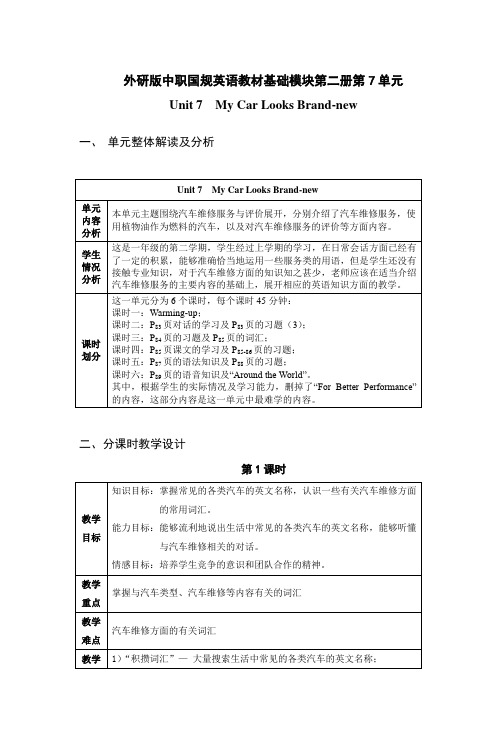
外研版中职国规英语教材基础模块第二册第7单元
Unit 7 My Car Looks Brand-new
一、单元整体解读及分析
二、分课时教学设计
第1课时
第2课时
第3课时
第4课时
第5课时
第6课时
作者简介
李艳,女,1981年12月生,湖北人,首都师范大学英语教育硕士,现就职于北京交通运输职业学院,英语讲师。
2005年,撰写《浅谈被动学习向主动学习的转化—发挥学生主动学习的能力》论文,获得北京市高职中专英语研究会二等奖;2008年,翻译《执行商》于中信出版社出版;2010年,参加外研社举办的中职英语课堂教学设计比赛,荣获一等奖。
Module7Unit2教案

一、教学内容
Module7 Unit2《The Olympic Games》
1.新词汇:奥运会相关词汇,如olympic, athlete, medal, stadium等。
2.语法:一般现在时态的运用,描述奥运会比赛项目和运动员。
3.对话:学生能够进行关于奥运会的简单对话,了解世界各国运动员的参赛情况。
-写作表达:在写作环节,如何将所学的词汇和语法结构应用到短文撰写中,对学生来说是一个挑战。
举例解释:
-对于词汇运用,教师可以通过角色扮演、小组讨论等互动活动,帮助学生将词汇融入实际情境。
-针对时态难点,教师可以设计图表、时间线等辅助工具,帮助学生理解时态的用法,并通过大量的例句和练习加以巩固。
-在文化理解方面,教师需要提供额外的资料和背景信息,通过视频、图片等形式增加学生的直观认识。
5.情感态度:激发学生对体育运动的热爱,培养积极向上的生活态度,增强团队协作和公平竞争的意识。
三、教学难点与重点
1.教学重点
-词汇:重点掌握奥运会相关词汇,如olympic, athlete, medal, stadium等,并能熟练运用这些词汇描述奥运会场景。
-语法:掌握一般现在时态的用法,能够用它来描述运动员在比赛中的表现和奥运会比赛项目。
(二)新课讲授(用时10分钟)
1.理论介绍:首先,我们要了解奥运会的基本概念。奥运会是全球最具影响力的体育盛事,它代表着运动精神和国际友谊。了解奥运会的历史和意义对我们开阔视野具有重要意义。
2.案例分析:接下来,我们来看一些关于奥运会的实际案例。这些案例展示了奥运会如何影响世界各国,以及它如何促进全球体育事业的发展。
-阅读理解上,关注学生对文章主旨和细节信息的把握。
Unit_7英语基础模块2
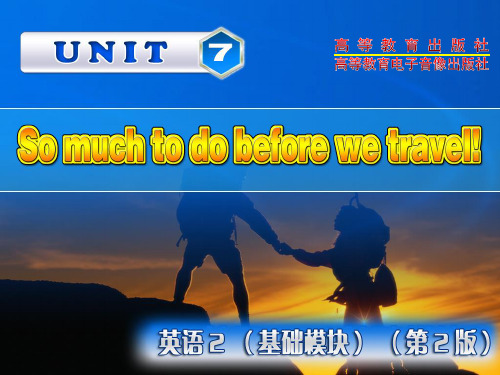
有往返票吗?
Excuse me, is this seat taken?
打扰一下,这个座位有人吗?
Can you keep an eye on my bag?
您能帮我照看一下我的包吗?
Where can I change the money?
我从哪里兑换货币呢?
Sorry, but you can’t take photos here. 抱歉,但是您不可以在这里拍照。
Places to go Royal Botanical Gardens Opera House Market or Sydney Aquarium Sydney Opera House Elizabethe Bay House Bondi Beach Sydney Harbor Bridge
10. Read and match.
11. Think and discuss.
We’ll go to the Great Wall in the morning . We’ll learn more about the history.
morning / Great Wall / learn more about the history
evening / National Grand Theatre / enjoy a show
When we come back, we’ll enjoy a show at the National Grand Theatre in the evening.
12. Write and practice.
Myra: Cash, umbrella, comfortable shoes, food for animals ...
英语基础模块2知识清单

英语基础模块2知识清单Unit 1.We laughed into tears。
一、重点短语1.visited the zoo 去动物园2。
pick apples 摘苹果3。
climbed the mountains 爬山4.on the beach 在沙滩上5.had great fun 玩得高兴6。
go swimming 去游泳7.enjoy oneself 玩得高兴8。
volunteer to do sth 志愿做…9.made a very big snowman堆雪人10。
cold and dry 又干又冷11.help with housework at home在家帮忙做家务12。
without hesitation毫不犹豫13。
be ill 生病14.volunteered to go 志愿做。
15.Half an hour 半个小时16。
laughed into tears 笑出眼泪17。
give him a shopping list 给他列购物清单18。
stay in bed 躺在床上19.the day before yesterday 前天20.chat online 网上聊天21。
an amusing story 一个有趣的故事22。
do the chores 做家务23. read aloud 大声朗读二、重点句型1How was your vacation你的假期怎么样2.What was the weather like in…?…的天气怎么样3。
They went sailing last summer。
去年夏天他们乘帆远航去了4.I prefer walking to cycling 比起骑自行车,我更喜欢走路5.Jack spent all day in watching football 。
杰克花费一整天时间看足球6.What did you do last weekend 上周末你做了什么?一般过去式(I)Unit2. I saw a terrible movie一、重点短语1。
- 1、下载文档前请自行甄别文档内容的完整性,平台不提供额外的编辑、内容补充、找答案等附加服务。
- 2、"仅部分预览"的文档,不可在线预览部分如存在完整性等问题,可反馈申请退款(可完整预览的文档不适用该条件!)。
- 3、如文档侵犯您的权益,请联系客服反馈,我们会尽快为您处理(人工客服工作时间:9:00-18:30)。
in the evening. Once you are in Sydney, it is a must-do.
Read the tour plan and complete the chart.
Day 2:
We’ll go to Elizabeth Bay House in the
morning. The house shows an entire picture of 19th century life. In the afternoon, we’ll drive to Bondi Beach. We
Read aloud after the tape and underline.
Cathy: Hello, Myra, we’ll be on holiday next week. What about traveling together? Myra: That’s a great idea, Cathy. Where shall we go?
Sydney Harbor Bridge
Read again and match the places with the activities.
Places Activities
Read the tour plan and complete the chart.
Time Morning Day 1 Afternoon Evening Morning Day 2 Afternoon Evening
Places to go Royal Botanical Gardens Opera House Market or Sydney Aquarium Sydney Opera House Elizabethe Bay House Bondi Beach
of fun. Every year, Sydney welcomes millions of tourists from all over the world. We have a two-day tour plan for you.
Read the tour plan and complete the chart. Two-day Tour Plan
bathing suit sunglasses
food
tent
cash
Listen again and complete the chart.
Who suggests?
Where to go?
mountain climbing go to a beach
Why ?
It’s a good exercise. enjoy the sunshine and swimming
What do you know about Sydney?
What is Sydney famous for?
Read the tour plan and complete the chart.
Sydney is on Australia’s southeastern coast. It’s a city
Cindy
Annie, we’ll be on holiday next week. _____________taking a trip together? • ---That’s a wonderful idea, Cindy._______________? • ---How about ______________? It’s a good exercise. • ---Mountain climbing is too tiring. Let’s go to ____________. We’ll enjoy some Sunshine and seaside swimming ---That’s a good idea. I really like the blue sea, too. What do we need to take with us? • ---_____________, ______________, ______________. • ---And a life ring. I can’t swim! • ---Sure. Where shall we stay? Shall we book a hotel? • ---No, we’ll stay in a tent. I have a very good tent. • ---That’s cool.
Day 1: We’ll start the day at Royal Botanical Gardens, an excellent place to relax and breathe the fresh air. The afternoon is free. We can go shopping at Opera House Market or visit Sydney Aquarium to get close to sea animals. When we come back, we’ll enjoy a show at the Sydney Opera House
有下星期二下午飞往悉尼的航班吗?
有往返票吗? 打扰一下,这个座位有人吗? 您能帮我照看一下我的包吗? 我从哪里兑换货币呢?
Where can I change the money?
Sorry, but you can’t take photos here. 抱歉,但是您不可以在这里拍照。
Work in pairs and answer the following questions.
Discuss what to bring when you visit these places.
big city cash bathing suit life ring camera sunglasses
food for animals
medicine comfortable shoes umbrella tent
Question
What are Cindy and Annie talking about?
They are talking about a trip.
Answer
Listen again and tick the items to bring.
camera exercise book comfortable shoes life ring
Discuss what to bring when you visit the places.
countryside cash bathing suit life ring camera sunglasses
food for animals
medicine comfortable shoes umbrella tent
can just lie on the beach and have a great
time. In the early evening, we’ll end our trip at Sydney Harbor Bridge. When we climb to the top of the bridge, we’ll see the whole city of Sydney in beautiful evening lights. If you want more information, just visit our website. We wish you a good trip!
Cathy: And a camera. We’ll take lots of
photos. Myra: Sure. Where shall we stay? Shall we book a hotel? Cathy: No, let’s stay in a tent. I have a very good tent. Myra: That’s cool!
Language Points
• 1. what about =how about 用于提建议,意为“ 怎么样” • 2. tiring “引起疲劳的,累人的” • 物作主语一般用“tiring”, 人作主语用“tired”来 修饰人,意为“疲乏的” • Be tired of : 对…感到厌倦 • 3. What do we need to take with us ? • 4. take a photo 照相 • 5. book (v) : 预定
Cathy: How about visiting a big city? We can go shopping!
Myra: Oh, big cities are too tiring. Let’s go to the countryside. We’ll enjoy the singing of birds and the beautiful views.
Make a dialogue about your one-week travel plan.
Place to go forest
Things to take tent, food, drink, food for birds and animals, warmer clothes, medicine, camera food, drink, food for fish, sunglasses, camera comfortable shoes, cash, credit card
Activities to do relax, enjoy the singing of birds boating, fishing shopping, seeing a movie, eating in a good restaurant
lake
downtown city
